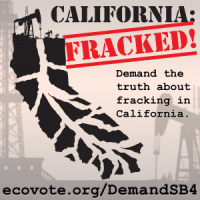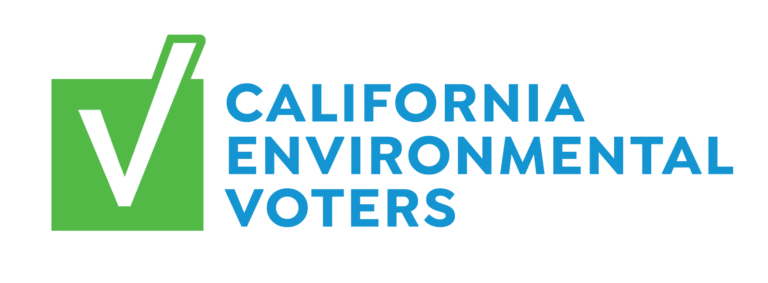
California is already fracked. We demand answers.
Today and for the last 60 years, oil and gas companies frack California without public notice. They inject acid into the ground, and they hide their “frack jobs.” They pump secret chemicals underground. They won’t tell, and they don’t have to tell – not even if you live next door. And it’s about to get even worse.
Demand to know the truth about fracking in California. Tell your Assemblymember to support SB 4, the environmental bill that forces Big Oil to answer to the public.
Right now in California there are no regulations, no oversight, and no consequences for the oil and gas industry that got us where we are today: fracked by hydraulics, pumped full of acid, and completely in the dark. It was recently revealed that oil companies have even been “quietly” fracking offshore in state and federal waters.
In its 2012 report “California Regulators: See No Fracking, Speak No Fracking” the Environmental Working Group said that “the state agency responsible for regulating oil and gas drilling in California has long turned a blind eye to the use of hydraulic fracturing (fracking), insisting as recently as this year that drillers rarely use the process in the state despite industry records documenting the practice at least as far back as 1953.”
But now it’s no secret that Big Oil is revving up for a fracking boom in California, using new and potentially more dangerous techniques, and we still don’t have a single fracking law on the books.
It almost goes without saying that any oil drilling practice that feeds our addiction to dirty energy is inherently bad. Fracking releases methane into the atmosphere, thereby contributing to the climate crisis. But fracking also poses a serious threat to California’s water supply and quality.
According to Clean Water Action, fracking requires an enormous amount of water — from hundreds of thousands to millions of gallons of water to frack a single well — and utilizes a mixture of chemicals, such as naphthalene, BTEX compounds (benzene, toluene, ethylbenzene, and xylene), methanol, and lead, many of which are toxic or are known to cause human health problems. The Central Valley, where the majority of fracking is taking place, is already under major pressure from contaminated drinking water sources. Fracking also poses risks to air quality and wildlife, and new studies have raised concerns about earthquakes linked to fracking (of particular concern here in California).
So, where is fracking taking place? Will it worsen earthquakes? What protects our groundwater from fracking chemicals? What exactly are those chemicals? Are they toxic?
Authored by environmental champion State Senator Fran Pavley, SB 4 is about finally getting answers to these critical questions. It would force companies to provide public notice in advance of new “frack jobs,” and to disclose the chemicals they’re using in fracking and other well stimulation methods, including acid injection. The bill would require ongoing groundwater monitoring before, during and after fracking takes place. It would also identify seismic faults near potential fracking sites. SB 4 would require an independent study of fracking and its risks to Californians, addressing occupational, public, and environmental health, among other provisions. If passed, SB 4 would provide for the most sweeping regulations of fracking in the nation.
But Big Oil isn’t giving up without a fight.
According to an editorial supporting SB 4 in the San Jose Mercury News:
The powerful Western States Petroleum Association is fighting fracking regulation. In the last six months alone, the oil industry spent more than any other lobbying group in California — more than $2.2 million — and succeeded in killing nearly a dozen bills.
The exception is Sen. Fran Pavley’s SB4, which passed the Senate and is scheduled for a hearing this month in the House…
Amazingly, Gov. Jerry Brown’s preliminary draft rules would allow fracking under land without telling the owners and would not allow for appeals, among other lax provisions. The industry is lobbying him to veto Pavley’s legislation if it passes. That would be a mistake. A recent poll by the Public Policy Institute of California found a majority of residents oppose the increased use of fracking.
As noted by the editorial, Senator Pavley’s SB 4 is the only remaining fracking bill before the state legislature. The alternative, if it fails, is relatively weak oversight of fracking by the state Division of Oil, Gas, and Geothermal Resources (DOGGR) (which until last year didn’t believe that fracking was widely used in California), potentially for years to come.
SB 4 is supported by numerous environmental, public health, and civic organizations including CLCV, Clean Water Action, Earthworks, Environmental Working Group, Natural Resources Defense Council, American Lung Association, and the League of Women Voters, among others. The bill is opposed by the chemical industry, the oil industry and some of their friends in the state legislature, who are eager to “narrow” the scope of SB 4 before it goes to its full floor vote in the state Assembly. Specifically, they’d like to remove language addressing acidization, the use of highly corrosive (and hazardous) chemicals like hydrofluoric acid to dissolve shale rock in order to get to oil.
But it’s important that the bill address this risky oil drilling practice, because it’s highly likely that oil companies will use acidization along with fracking to get at the oil under the Monterey Shale, a 1,750-square-mile area of underground shale rock that could contain as much as 15.4 billion barrels of oil.
According to the San Francisco Chronicle:
Most oil companies will say little in public about acidizing. They don’t want to reveal too much information to their competitors, each of which has its own methods and chemical formula. They also don’t want to draw the attention of the state’s powerful environmental lobby.
But environmentalists have noticed anyway. So have California lawmakers.
State Sen. Fran Pavley has included acidizing in a bill that initially focused on regulating fracking. Her bill, SB4, would require companies to obtain a specific permit from the state before acidizing or fracking a well. It also would commission a study of the threats each oil-production technique could pose to the environment.
“It’s one of those things where the more you read, the more questions you have,” said Pavley, D-Agoura Hills (Los Angeles County). “I’m concerned that the narrow focus on fracking isn’t sufficient to protect health and safety.”
A new two-part report from The Next Generation, “Distracted by Fracking,” which examines the public health and climate implications of tapping the Monterey Shale, calls hydrofluoric acid (HF for short) the “most dangerous chemical you’ve never heard of.” It quotes a 2013 survey of 50 U.S. oil refineries by the United Steelworkers union: “No industrial process risks more lives from a single accident than does the subject of this report – alkylation using hydrogen fluoride in oil refining.” According to The Next Generation report:
Remarkably, California health and safety regulators appear to be unaware that HF is being used. Clyde Trombetta, Cal-OSHA’s chief supervisor for both oilfield and refining operations, wrote in a June 14, 2013 email that he didn’t know that HF was being used in oilfields…
Chemical safety experts say that California’s pioneering use of HF poses unique challenges. “You have uncounted numbers of trucks moving HF around the state, it’s unclear whether the workers are trained in proper safety protocols, whether local first responders are prepared, or whether anyone is prepared for a potentially lethal accident of significant proportions,” said Kim Nibarger, a health and safety specialist for the United Steelworkers. “It seems totally unregulated.”
The report goes on to describe how Senator Pavley invited Chevron, Occidental and Venoco and the oilfield services company Halliburton to testify at a June hearing, asking them to provide information on “the type and number of oil stimulation treatments, including acid-based treatments” that the companies use and plan to use in California:
All three companies declined, deferring to two industry associations to address the panel’s questions. “We use acid because it’s effective,” testified Paul Deiro of the Western States Petroleum Association. “I’m unaware of any disasters related to this.” He urged the legislators to avoid “unnecessary” regulation of acidizing.
Faced with stonewalling, Pavley promptly amended her bill – which until then had been focused exclusively on fracking – to add a requirement requiring full disclosure of acidizing activities. She also added acidizing to the bill’s authorization for the state to commission an independent, peer-reviewed study of the environmental health effects of well drilling techniques.
With their backs toward Californians, oil and gas companies have been fracking California and hiding the facts for decades. Now they’re preparing to radically expand fracking operations as well as acidization, and still no law is in place that forces them to face the public.
Demand answers. Speak out for SB 4, the urgent environmental bill that forces Big Oil to face us.
In addition to opposition by the oil and chemical industries, the bill faces opposition from some in the anti-fracking camp; some groups don’t believe it goes far enough and continue to advocate for a moratorium or an outright ban on the practice. However, legislative proposals that included these approaches failed by wide margins (and would have likely been vetoed by Governor Brown had they succeeded). The bottom line is that unregulated fracking and acidization is a threat to California, and it’s critically important that we rein it in before the predicted boom. SB 4 will do just that, and it deserves the support of all who care about the environment and public health.


